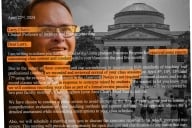You have /5 articles left.
Sign up for a free account or log in.
Patrick Bigsby is a student, employee, and wrestling fan of the University of Iowa. Sometimes, he tweets.
It is now March, more than a full month after the Iowa Caucuses. The dust has settled and the voters are back to their daily routines. It is possible to watch a local news broadcast without seeing highlights of a candidate gesticulating at a podium in a high school gymnasium, interrupted by ads showing another candidate gesticulating at a similar podium in the gymnasium of a rival high school. Presidential speculation and advocacy have hit a lull and the system is nearing pre-campaign equilibrium. Though the national discussion has moved on, ideologies remain in fierce competition in college classrooms.
This isn’t a new phenomenon; university campuses have well-documented political climates across the spectrum. College towns like Lawrence, Austin, or Madison stand out as islands of blue in red-leaning states. Ivy League institutions have historic links to archetypal old-money conservatism. Names like Oberlin or Berkeley evoke progressive connotations. Major religious schools, like Notre Dame or BYU openly advance their preferred agendas. As citizens of these campuses, we cannot help but observe and even be subtly influenced by our institutions’ respective dominant political climates. Yet, as graduate students, we are frequently expected to be above the fray, loyal to our intellects and logical capacities instead of mere political allegiance. Just as the law is reason free from passion (yes, that’s a Legally Blonde reference), our research requires clinical distance and a commitment to facts.
Several months ago, I was sitting in an employment discrimination seminar with a couple dozen of my peers. As you might expect, the class dealt with intersections of race, gender, sexual orientation, and other identity categories. Our discussions of these subjects invited disagreement, as well as an opportunity to share our varying backgrounds and experiences. One of my classmates, ‘Jay,’ was an extremely thoughtful and polite individual as well as an engaged and diligent student who very clearly cut against the grain of the dominant political ideology. Jay argued on behalf of ideas that many of classmates condemned as ridiculous or even abhorrent, even though they knew him to be an excellent student and kind person. Jay’s thoughts were deemed too similar to talking points associated with opposing ideologies and he was branded an object of scorn.
By week three of the semester, Jay seemed like the only one volunteering to speak in class. When he spoke, almost everyone else typed furiously, never looking up from their laptop screens. Curious as to why anyone would be taking such detailed notes on Jay’s comments, I peered over the shoulder of the student in front of me and saw an open Facebook chat with nearly every member of the class participating in an extensive sarcastic takedown of Jay. It grew uglier as weeks went by: when Jay shared the kinds of values he hoped to instill in his daughter, he was mocked. When Jay revealed that he had been physically abused by a substance-addicted father, he was derided. When Jay talked about the struggles of being a single parent and full-time student, he was jeered. Although his political compass may have pointed a few degrees away from the average, Jay wasn’t reciting party lines. He was engaging with the material based on his background and experience.
It was embarrassing to watch a room of scholars, future professionals, and classmates I respected resort to petty cyberbullying instead of taking the time to actually engage Jay, to hear his perspective, to try to persuade him of their own ideas. Knowing what people said behind Jay’s back, I maintained a monastic silence in the class lest I too be branded ideologically backward. Never mind my own political views; the risk of uttering an unpopular idea was suddenly too great knowing that I’d have to work closely with these classmates in the academic and professional worlds.
Without robust, uninhibited discussion, the seminar was rendered virtually devoid of value. No greater truths were uncovered or scholarship encouraged; our various commitments to the mainstream political climate prevented objective engagement with the material. I write about it here mainly because I hope others are spared this frustration. Whatever the dominant political slant on your campus is, look beyond it. Graduate students have the training and resources to evaluate and compare ideas and identify and study the sources of those ideas. It is a waste of our critical thinking skills to let our respective personal political leanings keep us from having the open minds necessary to explore opposite philosophies and learn what my favorite scholar might call “a little something extra.”
What is the political climate on your campus like? Does it impact academic life?
[Photo courtesy of Flickr user Jonathan Harford and used under a Creative Commons license.]








